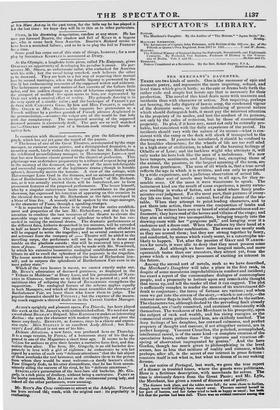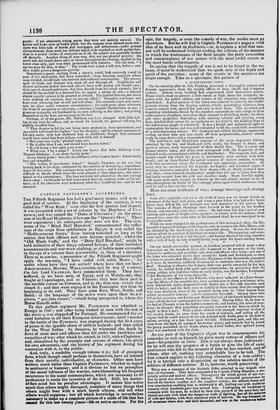THE MERCHANT'S DAUGHTER.
THERE are two kinds of novels. One is the successor of epic and dramatic poetry, and represents the more inquiring, refined, and level times which give it birth; as the epic or drama body forth the rather rude and simple but heroic age that is necessary for their production. The novel of this kind deals more with manners and incidents than with character or action. Not requiring, perhaps not bearing, the lofty dignity of heroic song, the condensed vigour of the dramatic muse, or the individualizing of general nature which should distinguish both, it must pay the minutest attention to the propriety of its modes, and test the conduct of its persons, not only by the rules of criticism, but by those of conventional propriety. Its plot, if it have any, must not only be critically pro- bable, but consistent with the daily experience of the period. Its incidents should vary with the nature of its scenes—what is con- sistent with the camp or the deck will shock if transported to the d rawing- room. It' passion be introduced, it should be confined to the humbler characters; for the wheels of life are too well oiled in a high state of civilization, to admit of the burning feelings of Othello or of Lear; and the luckless wight who attempts it, will only make his hero look like the man of a melodrama. We now have tempers, sentiments, and feelings; but, excepting those of the animal, the passions, in the largest meaning of the term, are gone from gentlemen. The sum of all which is, that a true novel reflects the age in which it is written, and can only be produced by a wide experience, and a judicious observation of actual life. The other sort of novels may belong to all ages, for they re- semble none. Of the mass it were wearisome to speak. The bettermost kind are the result of some experience, a pretty exten- sive reading in works of fiction, and a mind where fancy predo- minates over judgment. For the most part, their pictures of every- day life are true, but trivial ; natural, but of the nature of the tea- table. When they attempt to paint leading characters, and to put them into action, then comes the conjunction of lambs and tigers. The writers have seen or heard of social smoothness and re- finement; they have read of the heroes and villains of the stage; and they aim at uniting two incompatibles, bringing tragedy into the drawing-room with her "gorgeous pall," and hanging over it a cashmere and a dress-coat. When the authors try their hand at a story, there is a similar combination. The events are mostly such as they see around them; but they are strung together by fancy, and conducted, by means which rarely occur, to a catastrophe un- likely to happen. Yet, after the passion of GRAY and WARBUR- TON for novels, it were idle to deny that they must possess some interest. And although we have more languid minds, and more squeamish tastes than our ancestors, they attract yet, from the power which a story always possesses of exciting an interest in the future.
Among the second sort of novels, such as we have described, the Merchants Daughter will take a place in the first rank, in despite of some monstrous improbabilities in conduct and incident; too exact a report of the commonplace dialogue of commonplace people, and a propensity to lecture upon any remarkable thought that turns up, and tell the reader all that it can suggest. The plot is sufficiently complex to render the means of its unravelment dif- ficult to conjecture ; the turns of fortune are various; and when once we get into the stream of the story,—which is not early,—the interest never flags in itself, though often suspended by the author. The characters too, although dashed by the pervading fault already mentioned, are clearly conceived, and sustained consistently with themselves. The weakness of the Merchant in his prosperity, upon the subject of rank and wealth, and his rising energies as the commercial storm gathers round him, are skilfully touched. The deep feelings of his daughter, her outward calmness, and perfect propriety of thought and manner, if not altogether natural, are in perfect keeping. Viscount Clenellan, the polished, accomplished,. intellectual rascal, is of the same kind—a complete creation of the speculative brain, rather than " the vigorous and vivacious off- spring of observation impregnated by genius." And the hero Gordon, though too much given to philosophizing in the level scenes, has in him that mixture of reality and romance, which. perhaps, after all, is the secret of our interest in prose fictions : romance itself is not what is, but what we dream of in our waking dreams.
In our notice of Portugal, last week, we gave the true report of a dinner in troubled times, where the guests were politicians. Here is a fictitious description, with merchants for actors. The time is obviously drawn from the Great Panic; and Mr. Lyle,. the Merchant, has given a round of dinners out of policy.
The dinners took place, and the tables were full; for none chose to decline, though many would willingly have stayed away. Florence exerted herself in her part of hostess, and her father tried to look as happy as usual ; but both felt that the parties had been dull. There was an evident restraint among tins guests : if not absolutely acting parts, they were not entirely natural. The knives and lurks were as busily plied, but the tongues were allowed more rest : there was little talk of bonds, and mortgages, and debentures—under present circumstances, those were too delicate topics to be touched on with perfect free- dom in a mixed circle—if ventured on at all, the subject was generally broken off abruptly. Another thing of note was, that not one pleaded poverty : the word was not heard above once or twice throughout the evening, applied to the lower class only, and even then pronounced with timidity. Not one said, "I am too poor for this, or that." The words were a jest, a safe jest, before; now they might prove a dangerous gravity. Sometimes a guest, starting from a revcr:e, would look anxiously round to note if his abstraction had been remarked ; then, fancying suspicion where none existed, would dash into hurried and confused conversation. The gloomy spell of doubt and distrust WAS upon all and through all. Neighbours and former intimates looked into each other's faces with prying and fearful eyes; their speech showed politeness, but they shrunk from too much warmth, lest it shotild be the prelude to a demand for, or appear a pledge of, aid,—a demand almost equally ruinous to be granted or refused. The general distrust and alarm were making all cautious, may we not say selfish? Thoughts and hopes and fears were centering fast in self, and self alone. The common mind may main- tain its place under common circumstances; the truly great alone overcome the trials of prosperity or adversity,—showing a humble thankfulness in one, a generous sympathy not hardened by its own suffering in the other ; not priding themselves on the first, nor envying in the last.
Perhaps, of all the guests, Mr. Sibthorp was least changed : with little feel. ing at any time for others, and no dread for himself, the general suffering but slightly troubled him. " They deserve to fail for not being more prudent in their speculations, and any credit will stand the higher," was his thought ; and he refused assistance to his own uncle, who had sheltered him in childhood, though that assistance would have saved him from failure, with little risk to himself'.
" But your own uncle," pleaded some one.
" He is older than I am, and should have known better."
" It will bring a slur upon your name." " What care I for a name ? Every one knows that John Sibthorp is no Thomas Sibthorp: I am above family pride." ALove family pride? alas, the deceitfulness of the human heart below family love and sympathy.
" The walrus of merchants, indeed ! " thought Florence, as she saw him leaning back in his chair, exhausted by the exertion of devouring a superabun- dance of delimcies. The carriages were ordered early ; and it would have been difficult to decide which were the most pleased at their departure—the enter- tained or the entertainers. The host certainly felt relieved as the last carriage drove away : I e thought he had intercepted some sly, cautious looks at his pic- tures, as if the observers were reckoning what they would sell for—and he was annoyed.



























 Previous page
Previous page